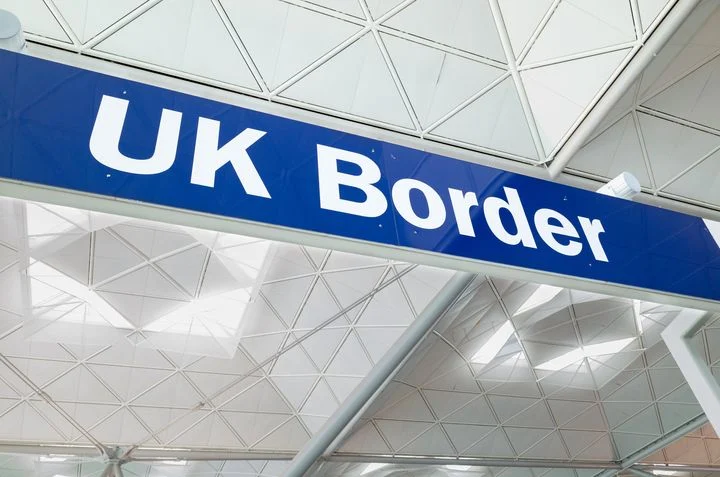
Here, the PA news agency takes a look at some of the language around the issue, including the difference between legal and illegal migration.
– What is migration?
Net migration is the difference between the number immigrating minus the number of people emigrating (Alamy/PA)
While the word migrants is used often, there are two types of movement – into the country (immigration) and out of the country (emigration).
In 2024, an estimated 948,000 people immigrated to the UK while 517,000 emigrated, according to the Office for National Statistics (ONS).
The difference between these two figures – the number of people immigrating minus the number of people emigrating – is what is known as net migration.
Net migration in 2024 therefore stood at 431,000 people.
The Labour Government has accused their Conservative predecessors of a “failed open borders experiment” which saw a large rise in net migration in recent years, reaching 873,000 in 2022 and 860,000 in 2023.
Labour has vowed to ensure a “properly controlled and managed” migration system.
– Who are migrants?
Most arrivals to the UK are people who have come here legally (PA)
Any person who is moving or has moved across an international border or within a state away from his or her habitual place of residence is a migrant, according to the definition from the United Nations’ International Organisation for Migration (IOM).
This is regardless of the person’s legal status, whether they have moved voluntarily or not, what the causes for the movement are and what the length of their stay is.
– Are most arrivals to the UK people who have come here legally?
Many arrivals come to the UK on a work or study visa (Alamy/PA)
Yes. Most people come here on a visa or through one of the Government’s humanitarian routes, such as a resettlement scheme.
Most of the people who immigrated to the UK in 2024 were from outside what is known as the EU+ area (the European Union, plus Norway, Iceland, Liechtenstein and Switzerland) and the ONS publishes a breakdown of the reasons these people came to the UK.
Of the 766,000 non EU+ nationals who immigrated to the country in 2024, 35% arrived on a study visa; 34% on a work visa; 10% on a family visa (joining relatives or partners who already have settled status in the UK); and 7% arrived via a humanitarian route.
Examples of recent humanitarian routes include the Afghan and Ukraine resettlement schemes, and the route for eligible British nationals wishing to relocate from Hong Kong.
Just 12% of non EU+ nationals who immigrated to the UK in 2024 were classed as people who had applied for asylum within a year of arriving in the UK, either via a regular route – having previously arrived legally on a visa – or who had come illegally, such as crossing the English Channel by boat.
– Are the words migrants, asylum seekers and refugees all interchangeable?
Not all asylum seekers will become refugees as some will have their claim refused (Alamy/PA)
No. An asylum seeker is a type of migrant. But there are other types, such as people who have been granted the right to come and live in the UK on a visa for a specific period of time to study or to work.
Asylum seekers have not been granted the legal right to come to the UK; instead, they are people who have travelled to the UK to claim asylum in the country.
Anyone seeking international protection from war, persecution and human rights violations can apply for asylum in the UK.
A person who has been granted the right to asylum in the UK is then classed as having refugee status in the country.
To stay in the UK as a refugee, you must demonstrate that you are unable to live safely in any part of your own country because of fear of persecution because of your race, religion, nationality, political opinion or other factors which might put you at risk such as gender, gender identity or sexual orientation.
Not all asylum seekers will become refugees as some will have their claim refused.
However, all refugees have previously been asylum seekers.
– Is it illegal to come to the UK to seek asylum?
Reasons for people seeking sanctuary in the UK can include joining family already in the country or knowing some of the language (PA)
It is not illegal to seek asylum in the UK but it is a criminal offence in the UK to enter the country without permission.
There is no asylum visa to come to the UK specifically for the purpose to claim asylum, however, you must be physically in the UK to apply for refugee status.
Under international refugee law, there is no requirement for asylum seekers to make a claim in the first safe country they arrive in after leaving their country of origin.
But under UK law, those who have a connection or travel through another safe country before reaching the UK could have their claim refused.
There can be a variety of reasons for people to seek sanctuary in the UK, such as joining family already in the country or knowing some of the language.
– How many people arrive in the UK illegally?
A small boat carrying people thought to be migrants leaves Gravelines in France (Gareth Fuller/PA)
The Home Office reports the number of people who have been detected arriving in the UK via illegal or what they refer to more commonly as “irregular” routes.
Irregular migration is a term used to describe people travelling from one country to another outside official rules and regulations, and is preferred by some campaigners who argue it is a less dehumanising term.
There were 49,341 people detected entering the UK this way in the 12 months to June 2025, most of them (88%) coming by small boat across the Channel.
The remainder were detected at airports, ports or already in the UK.
It is possible for someone’s status in the UK to become irregular if they have arrived in the UK by a legal route but then overstayed a visa.
The vast majority of migrants arriving across the English Channel claim asylum, but these arrivals accounted for less than two-fifths of the total number of people claiming asylum in the UK in the year ending June 2025, according to the Home Office.
Since Labour came to power in July 2024, the party has vowed to “smash the gangs” responsible for organising the Channel crossings, though tens of thousands have arrived this way since the general election.
In August the Government’s “one in, one out” deal came into force to send migrants who have arrived across the Channel back to France, and to bring approved asylum seekers via a safe route to the UK.
The first people were deported back to France under the pilot scheme in September, including those from Iran, Afghanistan, Eritrea, Somalia and India.
In the same month the first arrivals were confirmed as having been brought to the UK under the deal – a family of three, including a small child.
Campaigners have long argued there are not enough safe and legal routes for people to come to the UK, leaving some feeling they have no choice but to risk the dangerous Channel crossing.





